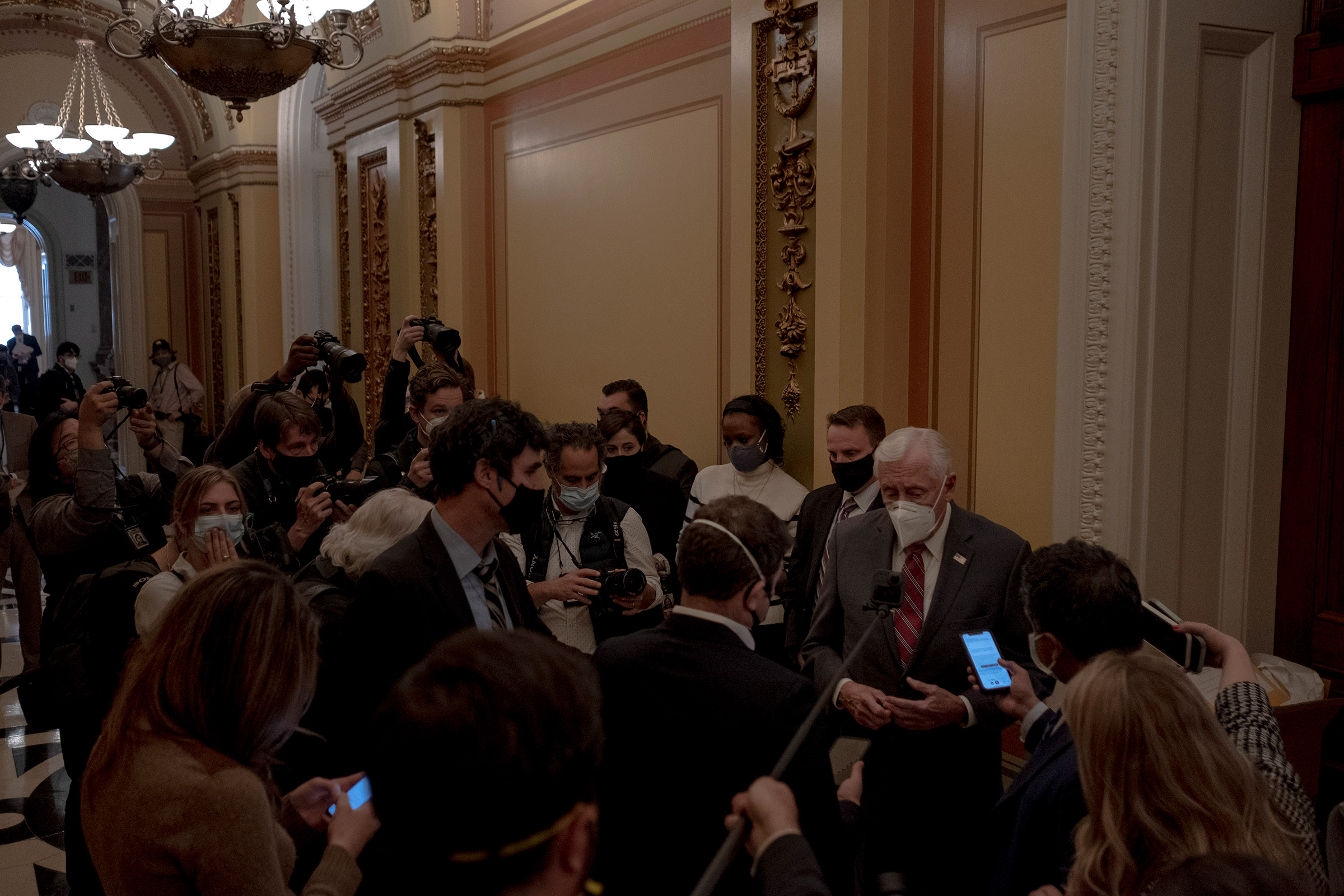Less than a week after President Trump incited a violent insurrection at the Capitol that sent hundreds of lawmakers into hiding and left five people dead, House Democrats are preparing to impeach him for the second time in 13 months.
As soon as Wednesday, Democrats could move forward with one article of impeachment against the President for “the incitement of an insurrection,” according to the resolution introduced on Monday. “Donald John Trump, by such conduct, has demonstrated that he will remain a threat to national security, democracy, and the Constitution if allowed to remain in office, and has acted in a manner grossly incompatible with self-governance and the rule of law. Donald John Trump thus warrants impeachment and trial, removal from office, and disqualification to hold and enjoy any office of honor, trust, or profit under the United States,” the resolution states.
More than 200 congressional Democrats, including House Speaker Pelosi and Senate Leader Chuck Schumer, quickly coalesced around the plan to force Trump’s resignation or press ahead with removing him. But privately, some Democratic aides and operatives are fearful that trying to push Trump out of office rather than letting him serve out the final few days of his term could backfire politically and create an unwelcome legislative distraction during the opening weeks of President-elect Joe Biden’s Administration.

Biden shares these concerns, according to three advisers. While he is publicly deferring to Congress, he knows Democrats’ efforts are highly unlikely to remove Trump from office early, does not want to distract from his legislative agenda and prefers to stay above the fray as he seeks to unify the country, the advisers say.
“He’s indicated, I think rather clearly, that he doesn’t see any great value in it, in that the Senate is never going to convict,” says former Connecticut Senator Chris Dodd, a longtime Biden adviser. Dodd thinks an impeachment push at this moment would rally the GOP around Trump. “Engaging in a futile effort at this juncture could play into his predictable hands and would be the subject of all the major news and conversation for the next 10 days,” Dodd says. “We ought to be talking about Joe Biden and his new Administration and what it means for people here and abroad.”
Biden declined to answer a question from reporters Sunday about any concerns he may have about the Democratic push to impeach Trump during the final days of his term. Aides to his transition referred TIME to Biden’s public comments on the issue.
Without even mentioning impeachment, Biden has said that he wants Congress to “hit the ground running” on legislation mitigating the health and economic crises paralyzing the country. “When Kamala [Harris] and I are sworn in, we are going to be introducing immediately significant pieces of legislation to deal with the virus, deal with the economy, and deal with economic growth,” he said Friday, in his first public remarks on the subject. “We’re going to do our job and Congress can decide how to proceed with theirs.”
Biden said Monday he had called the Senate parliamentarian to see if the chamber can split days between impeachment and his nominations and legislative agenda if an impeachment trial extends into the first days of his term. Speaking at a Newark, Del., hospital after receiving his second dose of a COVID-19. vaccine, he also reiterated that it was “critically important” that the country hold accountable “those folks who engaged in sedition and threatened people’s lives, defaced public property, caused great damage.”

It’s no surprise that Biden has left the matter to Congress. Endorsing impeachment, one adviser to Biden says, would inflame Republicans who he will need down the road to pass substantial legislation, and who are arguing impeachment would further divide the country. On the other hand, coming out against the impeachment push would upset members of Biden’s own party, who are furious that the President’s rhetoric put their lives at risk.
“This is a very conflicting decision for Democrats—for all of us, really,” says Moe Vela, a senior adviser to Biden during his vice presidency. “I think everyone agrees he has to be held accountable. It’s just what’s the most prudent way in light of timing, practicality and politics?”
Democrats are keenly aware that Biden might bear some political backlash for their decision. On a House Democratic caucus call Friday, Pelosi asked Rep. Adam. Schiff to outline how the impeachment process could unfold, including laying out political consequences and possible counter-arguments from Republicans. Schiff, who believes the decision lies with the House, also noted it was important to be aligned with the President-elect, according to a source familiar with his comments. (Schiff came out in support of impeachment before the call.)
Ultimately, the decision is not Biden’s to make. “He can’t really quite frankly do much about what Pelosi and Schumer are going to do,” says one longtime Biden adviser, who requested anonymity to speak candidly. “Because, quite frankly, they’ve got to take care of their base and their caucus too.”
Before moving to impeach Trump this week, Democrats will first try and force Trump’s resignation by pushing through legislation enhancing Congress’ role in invoking the 25th Amendment, Pelosi told her caucus Sunday evening. But even if that legislation passes, Vice President Mike Pence would still need to support invoking it, and he has has already reportedly refused to do so, according to Business Insider. If Pence does not respond by Wednesday, as expected, Democrats could move forward with the impeachment vote, Majority Leader Steny Hoyer told reporters Monday.
Experts on both sides of the aisle believe Democrats can build a strong legal case for impeachment. Trump could respond with a defense centered on the First Amendment and an argument that he had no intention of provoking violence, says Robert Ray, a member of the President’s legal team during the 2020 impeachment trial. But “‘the President incited a riot’. is a better argument than what they had last time,” Ray said.
A conviction in the Senate would require 67 votes, meaning least 17 Senate Republicans would need to join Democrats in voting to remove Trump from office. While some GOP Senators, like Alaska’s Lisa Murkowski, Nebraska’s Ben Sasse, and Pennsylvania’s Pat Toomey, have said Trump should resign or that they would consider impeachment, none have explicitly said they would support the effort. Many oppose it on the grounds that it would further divide a shaken nation, making the math unlikely for a bipartisan conviction.
Still, Democratic leadership says they must forge ahead. “Whether impeachment can pass the United States Senate is not the issue,” says Hoyer. “The issue is, we have a President who most of us believe participated in encouraging an insurrection and attack on this building and on democracy in trying to subvert the counting of the presidential ballot.”
A Senate trial could occupy the first weeks of Biden’s term at a time when Democrats narrowly control all three branches of government, imperiling both their legislative agenda and Biden’s Cabinet confirmations. Some Democrats think it could jeopardize their support among the moderate voters the party will need to retain control of Congress in the 2022 midterms.
“I can assure you we will overplay our hand and the American people will be turned against us,” says a senior congressional aide affiliated with the moderate wing of the Democratic Party. “Everyone knows [Trump] committed an impeachable offense. We don’t trust our party to handle this properly.”
More Must-Reads from TIME
- Donald Trump Is TIME's 2024 Person of the Year
- Why We Chose Trump as Person of the Year
- Is Intermittent Fasting Good or Bad for You?
- The 100 Must-Read Books of 2024
- The 20 Best Christmas TV Episodes
- Column: If Optimism Feels Ridiculous Now, Try Hope
- The Future of Climate Action Is Trade Policy
- Merle Bombardieri Is Helping People Make the Baby Decision
Write to Alana Abramson at Alana.Abramson@time.com